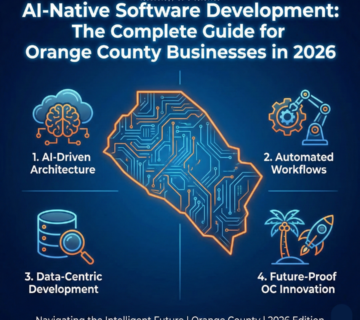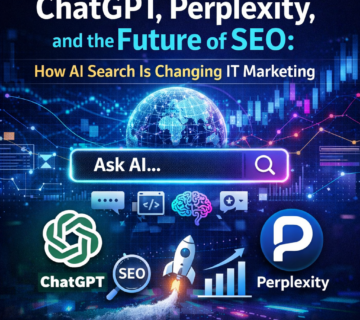SearchGPT vs. Google vs. Bing: A Comprehensive Review of Search Results
🎧 Listen to Our Podcast on Your Favorite Platforms! 🎧
Subscribe: Youtube | Spotify | Amazon
SearchGPT vs. Google vs. Bing: A 2024 Search Engine Comparison for Businesses
AI-driven SearchGPT is essential for SEO professionals, marketers, and content creators. In this review, we’ll examine how SearchGPT compares to traditional engines like Google and Bing. We’ll look at various queries to uncover SearchGPT’s strengths, limitations, and its impact on search behavior.
The Evolution of AI in Search: From Google and Bing to SearchGPT
With AI’s rapid evolution in SEO, traditional search engines are adopting AI-powered tools to refine user experiences. Google introduced “AI Overviews” in May 2024, followed by Bing’s own generative search pilot in July, launching a fully integrated version by October. Then, OpenAI introduced a SearchGPT prototype in late July, officially launching ChatGPT Search on October 31, 2024.
As SearchGPT gains popularity, users and the industry are adopting the terms “ChatGPT Search” and “SearchGPT” interchangeably. Both Bing and Google’s AI tools have shifted the landscape, but ChatGPT Search offers unique features that set it apart, particularly in how it handles data, generates responses, and ranks results.
Understanding SearchGPT’s Potential to Drive Traffic
Since its launch, ChatGPT Search has experienced significant user engagement, with over 200 million weekly active users by August 2024. This increase signals a shift toward AI-based searches and a change in user behavior. Gartner’s prediction that “search engine volume” will decline by 25% by 2026 aligns with the growing use of AI in search.
Key Observations: How SearchGPT Handles Queries
In his tests, Dan Taylor noted several interesting aspects of SearchGPT’s approach to search:
- Indexing Beyond Traditional Rankings: SearchGPT references pages that don’t necessarily rank within Bing’s top 100. This raises questions about how content is indexed and ranked differently than in traditional search engines.
- Discrepancies in Bing’s and SearchGPT’s Results: Despite being built on Bing’s data, SearchGPT often delivers different answers, even when responding to identical queries.
- Variation in Response Consistency: Results can vary significantly, even for the same query from the same user, indicating adaptive learning.
- Strengths in Niche Queries: SearchGPT often excels in niche topics with limited online data, surpassing both Google and Bing in accuracy.
- Local Search Limitations: Local queries were less reliable, occasionally generating responses that did not align with local relevance.
- Parameterized URL Tracking: SearchGPT appends URLs with
?utm_source=chatgpt.com, which assists in tracking traffic directly from ChatGPT sources. - Content Diversity in Citations: SearchGPT sometimes cites sources like maps, images, and paywalled content without clarity, adding variability in the user experience.
Bing’s Rising Role in AI-Powered Search
Historically, Bing has been considered secondary to Google in search. However, with its integration into SearchGPT and other AI tools, Bing’s role in search ecosystems is increasingly relevant. OpenAI’s dependence on Bing underscores the importance of Bing’s indexing in ChatGPT Search, so websites not indexed on Bing won’t appear in SearchGPT results. Nonetheless, even top-ranking Bing results don’t always align with SearchGPT citations, illustrating a complex selection process in ChatGPT.
Comparative Analysis: SearchGPT, Google, and Bing on Different Query Types
Taylor analyzed a range of queries across Local, Your Money or Your Life (YMYL), ecommerce, and informational searches. Here are some insights into how each platform responds to these types of searches:
- Local Searches: SearchGPT’s handling of local queries leaves room for improvement. For example, a search for “enterprise technical SEO agency” resulted in varied, geographically inconsistent results that didn’t account for the user’s location effectively. This contrasts with Google, which reliably tailors local search results based on IP.
- Ecommerce and High-Intent Queries: High-intent ecommerce queries, such as “best Christmas gifts for him 2025,” were generally well-served by SearchGPT. The cited results included recent articles, while traditional engines sometimes displayed outdated content, offering a potential advantage for SearchGPT in time-sensitive queries.
- YMYL Searches (Health and Finance): YMYL queries, which involve sensitive topics like health and finance, demand accuracy and trustworthy sources. SearchGPT cited well-known and credible sources, although with occasional discrepancies compared to Google and Bing. For instance, in a query about “how to lower cholesterol,” both Google and SearchGPT included reliable sources, yet SearchGPT pulled in more diverse URLs, some of which were less prominent in traditional search rankings.
- Informational and Trending Topics: On queries surrounding emerging trends, such as “remineralizing gum,” SearchGPT performed effectively, citing reputable sources like WebMD. However, unlike Google, which typically ranks authoritative sources first, SearchGPT draws from a more extensive range, sometimes including lower-ranking sites that provide unique information on niche topics.
Local Search in SearchGPT: Challenges and Observations
Local businesses rely on search engines to drive traffic, and the limitations in SearchGPT’s local search capability may impact its usefulness in this area. For example, Taylor’s test query for “digital marketing agency in New York” showed a map with sources from a single website listing eight agencies from paid directories rather than a broader range of agencies relevant to New York’s diverse market. In contrast, Google and Bing provide more comprehensive local business results.
SearchGPT’s handling of “maps” also varied. Unlike Google’s interactive Maps, SearchGPT’s maps lacked depth and were often limited to data from a single source.
YMYL Search Accuracy and Trustworthiness
For YMYL queries, which cover areas that directly impact a person’s health, safety, or finances, accuracy is paramount. Taylor tested queries like “who can sign a contract on behalf of a company” and observed that ChatGPT Search generally provided detailed, structured responses, referencing reputable legal resources. However, responses varied depending on query timing, with SearchGPT showing a deeper understanding of context over time. Google and Bing, while also reliable, tended to prioritize results from more established sources.
Ecommerce Searches: High-Intent Product Queries
Ecommerce queries, such as “Nike Air Max size 10 deals,” reveal the advantages and limitations of each platform. SearchGPT delivered direct responses with cited sources from popular ecommerce sites like Amazon and SportsDirect, yet sometimes provided outdated pricing information, which could mislead potential buyers. Google’s approach integrates shopping tabs and current pricing more effectively, maintaining a more updated response.
Similarly, in holiday shopping queries like “best Christmas gifts for him 2025,” SearchGPT listed recent articles that matched intent. Taylor noted that AI Overviews from Google still cite some older pages for similar queries, highlighting SearchGPT’s potential strength in delivering timely results.
Travel Search Results: Fashion and Travel Images
For travel-related queries like “best holiday destinations 2025,” SearchGPT highlighted images in its response, especially for visual-heavy sectors such as fashion and travel. Google and Bing can also provide image-driven results, though SearchGPT’s image selection occasionally lacked citation transparency, making it challenging for users to verify the source of travel recommendations. In general, Google remains a stronger resource for interactive travel planning and booking options.
Summing Up: Strengths and Limitations of Each Search Engine
SearchGPT shows distinct advantages in delivering up-to-date, niche content and adapting to emerging trends faster than Google or Bing. Its AI-driven approach enables it to cater effectively to unique, specific, or time-sensitive queries that traditional search algorithms may not capture as dynamically. However, SearchGPT has notable limitations in local search accuracy, pricing accuracy in ecommerce, and interactive elements for travel and map queries.
While Google retains its edge in comprehensive indexing, YMYL content, and ecommerce, SearchGPT’s advantages in personalized results and trend responsiveness make it a promising addition to the search landscape. Bing’s generative search, meanwhile, provides a middle ground, particularly for users in specific markets who benefit from Bing’s data integration with Microsoft’s tools and platforms.
Will SearchGPT Disrupt Google’s Dominance?
With users increasingly turning to AI-driven platforms, ChatGPT Search could pose a genuine challenge to traditional search engines. Yet, like many disruptive technologies, SearchGPT’s long-term success depends on user trust and adaptability to varied search needs. While it may not fully replace Google, it can become a powerful supplementary tool, especially as users become more accustomed to AI-driven search features.
For marketers and SEO professionals, the key takeaway is to understand each platform’s strengths and weaknesses. As the search industry becomes more diversified, optimizing content for both traditional search engines and AI platforms like SearchGPT may offer businesses the best chance at visibility and engagement.
Frequently Asked Questions (FAQ)
Q1: What is SearchGPT, and how does it differ from Google and Bing?
A: SearchGPT, developed by OpenAI, is an AI-powered search model integrated within the ChatGPT platform. Unlike Google and Bing, which rely on traditional search indexing and ranking, SearchGPT uses generative AI to create contextual answers to queries. This enables it to pull from a broader database, sometimes including sources that wouldn’t rank in the top results on Bing or Google. It’s particularly effective for niche queries and emerging trends, offering real-time adaptability that traditional search engines may lack.
Q2: Can SearchGPT replace Google for daily searches?
A: While SearchGPT is a powerful tool, it currently lacks some key features of traditional search engines. For instance, Google and Bing provide highly refined local search results, ecommerce integration, and a broader range of interactive tools like maps, real-time pricing, and comprehensive travel options. SearchGPT complements these platforms rather than fully replacing them, particularly for niche queries and real-time insights.
Q3: How does SearchGPT handle local and time-sensitive queries compared to Google and Bing?
A: SearchGPT can understand and respond to time-sensitive queries with a high level of accuracy. For instance, when searching for recent news or trends, SearchGPT may sometimes deliver more recent citations than Google’s AI Overviews. However, local search is an area where SearchGPT has limitations. Google and Bing offer more reliable, location-specific results, particularly for businesses and services, due to their established algorithms and extensive local data.
Q4: Is optimizing for SearchGPT different from traditional SEO?
A: Yes, optimizing for SearchGPT requires a strategic shift. Traditional SEO primarily focuses on ranking in Google or Bing by improving factors like on-page SEO, backlinks, and content quality. In contrast, SearchGPT pulls from a broader, sometimes less structured dataset. Businesses should focus on creating authoritative, high-quality content and using structured data to increase the chances of being referenced by SearchGPT.
Q5: What types of businesses benefit most from SearchGPT?
A: Businesses that cater to niche markets, frequently release trending or time-sensitive content, or seek an alternative channel to connect with specific audiences may find SearchGPT particularly advantageous. Sectors like technology, fashion, and emerging markets can leverage SearchGPT for increased visibility. However, for more established industries or those reliant on local search (like brick-and-mortar businesses), Google and Bing remain essential.
Q6: Can Technijian help companies optimize for SearchGPT?
A: Absolutely. Technijian provides specialized support for companies looking to optimize their digital presence across multiple search platforms, including SearchGPT. By focusing on content quality, structured data, and AI integration strategies, Technijian ensures businesses can maximize their visibility and performance in this evolving search ecosystem.
How Technijian Can Help Businesses Adapt to SearchGPT, Google, and Bing
Technijian is uniquely positioned to help businesses navigate the complexities of today’s diverse search environment. Here’s how Technijian can support companies in adapting to and optimizing for SearchGPT, Google, and Bing:
1. Strategic SEO Adaptation for AI and Traditional Search
Technijian works with businesses to create a multi-channel search strategy that incorporates AI-driven platforms like SearchGPT alongside traditional search engines. This approach ensures maximum visibility across different user bases and search preferences.
2. Optimizing Content for Multi-Modal and AI-Powered Searches
With the rise of multi-modal search (such as TikTok and image-driven queries), Technijian helps businesses develop content that resonates across all platforms. From visuals and video to long-form articles, Technijian’s expertise in content creation ensures businesses can capture attention and engagement across all major search engines.
3. Implementing Structured Data for Enhanced AI Integration
Structured data is vital for being referenced in AI-powered searches. Technijian helps businesses implement schema markup, ensuring that content is easily interpreted by AI algorithms, improving the chances of appearing in SearchGPT responses and enhancing Google’s AI Overviews.
4. Enhancing Local SEO to Compensate for SearchGPT’s Limitations
Given SearchGPT’s limitations in local search, Technijian emphasizes strengthening local SEO on Google and Bing. This ensures businesses maintain a strong presence for local audiences, especially for queries where SearchGPT falls short.
5. Time-Sensitive Content Optimization for Emerging Trends
Technijian works with businesses to produce and optimize time-sensitive content that appeals to the AI-driven search behaviors of SearchGPT. This approach is particularly beneficial for industries where keeping up with trends and new information is crucial, like technology, fashion, and ecommerce.
6. Comprehensive Data Tracking and Analytics Across Platforms
Technijian leverages Google Analytics, Looker Studio, and other tools to track performance across different search engines, including SearchGPT’s impact. This tracking provides actionable insights into where traffic originates, enabling businesses to adjust strategies for each platform accordingly.
7. Customized SEO Strategy Tailored to Each Client’s Goals
Recognizing that every business has unique needs, Technijian tailors its SEO strategies to align with each client’s goals. For example, an ecommerce business may prioritize product visibility across all platforms, while a service-based business may focus on strengthening local search on Google and Bing. This individualized approach maximizes impact across the full range of search channels.
By staying at the forefront of search technology advancements, Technijian offers businesses the expertise and tools they need to navigate the rapidly evolving search landscape, making sure they’re prepared for the opportunities that both AI-driven and traditional search engines present.
About Technijian
Technijian stands at the forefront of managed IT services in Orange County, delivering dynamic solutions that empower businesses to stay competitive in an ever-evolving digital world. Based in Irvine, we proudly serve companies across Irvine, Anaheim, Riverside, San Bernardino, and Orange County with solutions that ensure seamless, secure, and scalable IT environments.
Our position as a trusted managed service provider in Irvine is built on our commitment to excellence and client-focused service. Whether you need IT support in Irvine or IT consulting in San Diego, our team of experts is equipped to align your technology with your business goals. We bring deep expertise in IT support in Orange County, managed IT services in Anaheim, IT infrastructure management, and IT outsourcing services, allowing you to focus on growth while we manage your technology needs.
At Technijian, we specialize in comprehensive, customizable managed IT solutions for businesses of all sizes. From cloud services and IT systems management to business IT support and network management, our services are crafted to enhance efficiency, protect data, and ensure robust IT security. With dedicated support across Riverside, San Diego, and Southern California, we’re here to keep your business operating smoothly and securely.
Our proactive approach includes disaster recovery, IT help desk support, and IT security services to safeguard your operations and minimize downtime. We offer a comprehensive range of services that adapt to your business, including IT support in Riverside, IT solutions in San Diego, and IT security solutions in Orange County—so your operations remain resilient, agile, and prepared for the future.
With Technijian, you gain more than just an IT partner—you gain a strategic ally committed to optimizing your IT performance and helping you thrive. Experience the Technijian advantage today with tailored IT consulting services, IT support services in Orange County, and managed IT services in Irvine that meet the demands of modern business.






